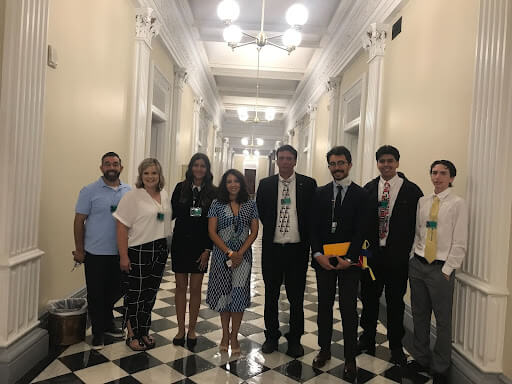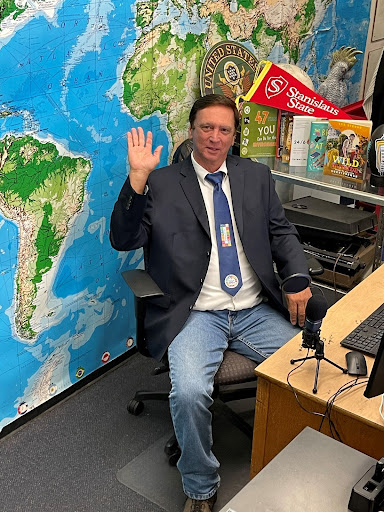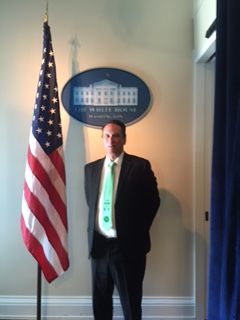The Junior Ambassadors in the Merced Union High School District are answering their State Seal of Civic Engagement call through California’s Department of Education’s Green Ribbon Schools (GRS) program. Students have modeled the three pillars of the GRS to reduce environmental impact and costs, improve the health and wellness of students and staff, and provide environmental education that incorporates science, technology, engineering, mathematics, civic skills, and green career pathways to help an all-girls school, Daraja Academy, in Nanyuki, Kenya. The two school systems are brought together through a Sister School project called Green That School (GTS), which promotes an end to gender inequality and violence, advocates for women’s empowerment through quality career technical education, supports and strengthens peaceful, inclusive communities that provide justice for all, and builds global partnerships for sustainability.

In Kenya, government-funded education ends at the eighth grade. For many girls, who may be from families of fishermen, animal herders, farmers, or traders in rural areas, a high school education is out of reach. (For families with the resources to continue their child’s education, priority goes to the eldest son.) Without a path to secondary education and career opportunities, girls may live in poverty or be sold into arranged marriages to help sustain their families.
Daraja Academy, which provides a full scholarship for every student admitted, offers girls an alternative path to this life of subjugation and poverty. The school prepares students for the national exam and university admission. Over 93 percent of Daraja graduates accept a professional job within three months of graduating from a university. For the 7 percent of students who still need to pass the national exam, Daraja teaches them professional skills and helps them secure a job in the larger city. Daraja’s graduates send up to 60 percent of their income home, often keeping their younger sisters out of arranged marriages and their families economically sustained.
Daraja Academy is one of the best in Kenya, if not the world, at lifting girls out of hunger and poverty. By helping girls halfway around the globe, students from MUHSD learn professional skills that will help them in their college and career journeys. Problem solving, communication skills, leadership knowledge, and teamwork are built or sharpened while working on the Green That School project. Alondra Huerta, a junior at Yosemite High School in Merced, said, “Working on this project helped me understand how fortunate I am as a female student in America. It has changed my perspective of many opportunities and inspires me to help people with little political power or voice.”
The GTS program illuminates solutions to problems faced by the girls of Daraja. Some of these are more straightforward, like unreliable energy, unsafe drinking water, and challenges related to facilities management. A collaboration with the Sunrise Rotary Club of Merced addresses these issues by implementing more solar battery systems, eliminating bacteria and dangerous chemicals in the water supply with atmospheric water generators, and providing more environmentally friendly cleaning supplies. The local nonprofit also bought two sets of uniforms for the incoming freshman class. Modeling the GRS application process will effectively “green the campus” through meaningful environmental practices. However, the more complex and systemic inequities will require tact, perseverance, and crowdsourcing.

As a United Nations ambassador for the 17 Sustainable Development Goals and host of the YouTube channel The 17 And Me Show – United Nations 17 SDG’s, I believe that creating relationships between students from opposite parts of the earth with significantly different social norms adds devotion by both schools to improve the girls’ lives, as well as to address social and environmental inequity issues here and at home. When students see how bad it is in other places, they tend to want to be persistent in changing policies locally. The comparison of societies illustrates that such change is a long haul, not a sprint, and if there had been an easy fix, it would’ve been fixed long ago.
For a comprehensive global effort, the GTS project has collaborated with Climate Action Schools, a Take Action Global (TAG) program that assists young people across seven continents in connecting virtually to help curb climate change while also addressing the United Nations’ seventeen SDGs. Education is the key that allows foreign and domestic people to solve the social changes needed for equity within global communities.

To broaden awareness of the girls of Daraja and the inequities they face, the students are participating in the KQED Call for Change by producing a documentary showing how one of the global community’s most marginalized peoples is winning the fight for their educational and economic lives while simultaneously helping to save the planet for the world’s more fortunate. This project helps remove gender-based violence and heinous cultural practices from the information bubble that keeps knowledge of these acts of suppression localized in the region. It promotes social justice and equality through education, civic engagement, and fidelity to the UN’s seventeen SDGs.
The California Environmental Literacy Initiative (CAELI) is another effort that promotes the State Seal of Civic Engagement, having produced a State Seal of Civic Engagement Environmental Literacy Implementation Guide. It advocates that students support environmental literacy and civic engagement through informed action on essential local and global issues. A great example of students engaging in governmental policies and procedures came in July, when the MUHSD team of students and teachers flew to Washington, DC, to accept the Green Ribbon Schools plaque at the US Department of Education ceremony. But instead of resting on past environmental success, the team requested meetings with some of the highest officials to showcase what drives students’ interests and to ask for increased support for the GRS award and their GTS project. The team met with Vice President Kamala Harris’s environmental team in the White House, US Ambassador to Kenya Meg Whitman, Senator Alex Padilla, and Congresswoman Maxine Waters. They also attended a reception hosted by Congressman Jim Costa to highlight their efforts to help the most marginalized people in Kenya, young women in economically depressed areas.

The students were also invited to the US Department of Education to meet with Deputy Secretary Cindy Martin, where they discussed district projects, programs, and personal goals after graduation. The GTS project exemplifies the department’s Climate Adaptation Plan, which envisions enhancing resilience in the face of the challenges presented by climate change through supporting educators, parents, and student communities that are climate literate and prepared to act in support of climate change mitigation and adaptation. This collaboration with federal, state, and local educational agencies and non-governmental organizations helps to coordinate efforts to educate and create equity.
QS Reimagine Education had over eleven hundred applicants for its Reimagine Education Awards Competition. The Green That School project was selected for the contest and has advanced to be shortlisted for the Sustainability Education Award. This award will go to the most innovative approach for encouraging and teaching sustainable development principles and best practices. Participants are judged on economic, environmental, and/or social sustainability involvement. As a shortlisted project, the program will be showcased in Cairo, Egypt, and Philadelphia, Pennsylvania, and have a chance to be awarded $25,000 to help the girls of Daraja Academy.

